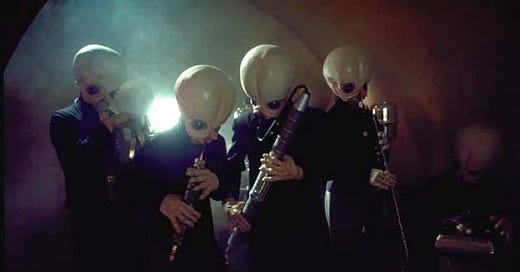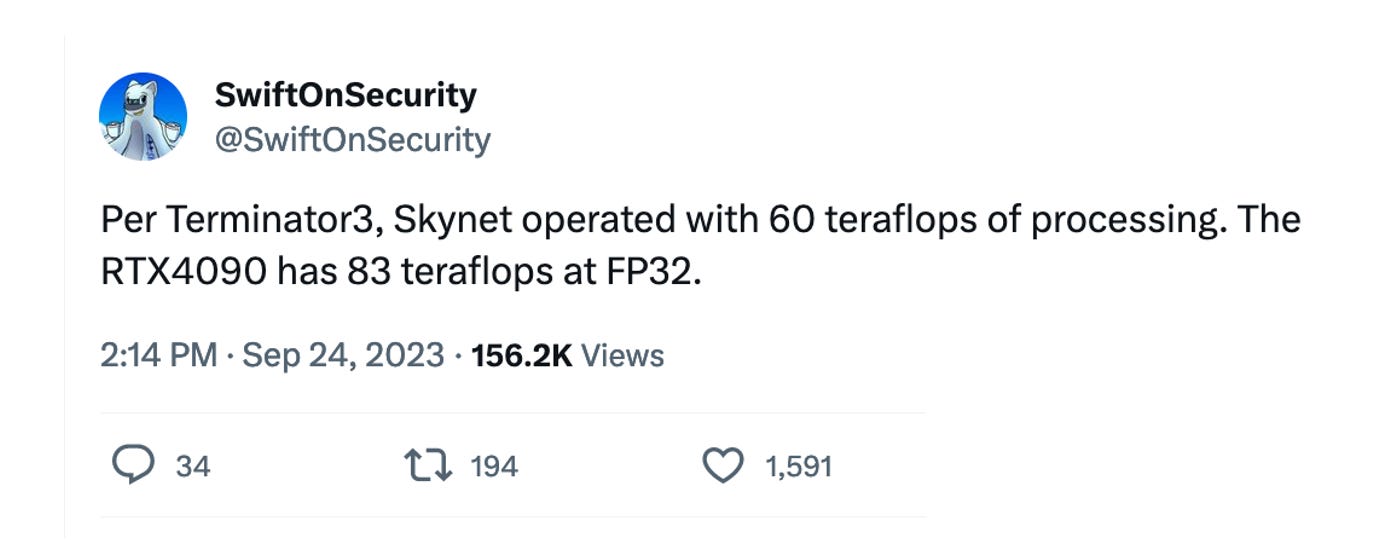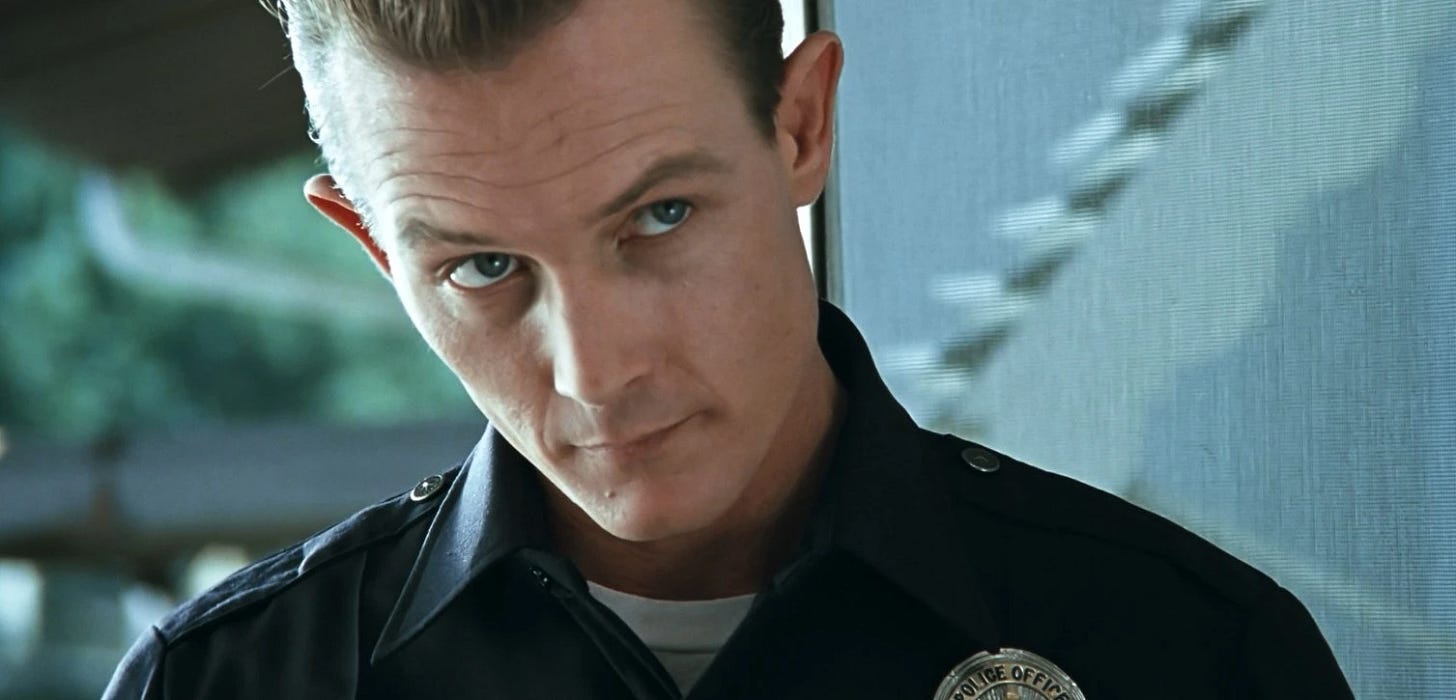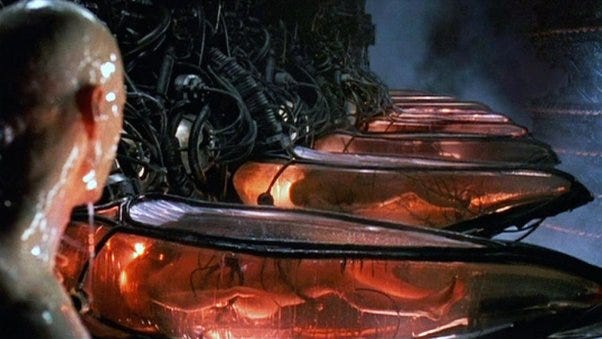AI Is Defeated in Hollywood—But What About Music?
I describe a legit pathway to victory, but we need a general to lead the battle
AI was the toughest issue to resolve in the Hollywood screenwriters’ strike. Who could have anticipated that just a few months ago?
But nowadays we’re living inside a Terminator movie—the only difference is that it’s your job getting terminated.
That was probably inevitable. But I always figured that when the Terminator finally arrived from the future, he would take out politicians in DC first.
It would be a cinch—if you blew on some of those folks, they’d fall over.
The Honest Broker is a reader-supported guide to music, books, media & culture. Both free and paid subscriptions are available. If you want to support my work, the best way is by taking out a paid subscription.
Instead, AI left politicians alone, and decided instead to terminate writers, artists, and musicians.
So screenwriters had genuine concerns. They really did need to fight over this issue. And they got a victory (which I’ll discuss more below). The Terminator now has to focus on something else—maybe getting a million software developers fired or whatever else Terminators enjoy terminating.
I’m happy the writers got a win. But what about musicians?
The same day I heard about the new screenwriters’ contract, I read this account from musician Bill Cantos.
This would make for a Kafka-esque scene in a sci-fi comedy. You take a time machine to the future, and everybody is listening to crappy bossa nova Muzak—because, hey, the robots demand it.
This might be funny, except that it’s actually what’s underway in music right now. AI tracks are showing up everywhere, but not because they’re good. There are no devoted fans of this genre. It’s only happening because AI music is cheap, and somebody can make a buck by getting rid of the musicians—provided listeners aren’t paying attention.
If you think this over, you immediately grasp that:
AI music is more profitable for streaming platforms, because they can buy it as cheap work-for-hire (or even make their own tracks at almost no cost).
But these AI tracks are markedly inferior. Listeners won’t prefer them or seek them out.
So they need to make users as passive and indifferent as possible in order to reap the cost savings.
This explains, I believe, why streaming music platforms are so dull and unexciting. Or why they give us so little information about musicians. Or why they are so anxious to take the responsibility for ‘music discovery’ away from listeners and handle it themselves.
Dull and banal is part of the plan.
We’ve finally heard the music of the future, and it’s a soundscape for snoozeville. We’re a long, long way from the Star Wars cantina band. But what does this kind of institutionalized passivity do to our music culture?
I say these things based on analysis and inference, but facts are scarce. The reality is that the streaming platforms make it hard to figure out what they’re doing.
So I can’t prove that cost savings from AI is why Spotify gives 49 different names to a 52-second track, that is almost identical in each instance. (We only found out because a listener actually compiled a list.)
And I can’t prove that cost savings is the driving force behind all those fake artists on the platform.
And I can’t prove that the background jazz playlists—filled with artists I’ve never heard of, playing tinkly generic improvisations—are constructed to improve profit margins.
But what other reason do streaming platforms have for promoting these insipid tracks instead of music by esteemed and beloved human artists?
“Dull and banal are part of the plan.”
It would be great if streamers told us which tracks were AI-generated. (Shouldn’t there be a law requiring that? Don’t we have a right to know the ingredients?) But they seem reluctant to share that info.
That’s another sign that AI music is not the great innovation we were promised. If this tech were really so transformative and exciting and mind-expanding, the businesses using it would brag about it.
Instead, everything is happening quietly and behind-the-scenes—just as in those dystopian films.
Let’s return to the screenwriters. It’s worth noting that their new deal does not prohibit AI. The new contract simply makes it harder for studios to use AI for cost-savings.
Some people are disappointed by this. They want more. But the screenwriters actually got exactly what they needed.
AI in Hollywood will now have to compete on the basis of quality, not terminating. And if it produces outstanding results, everybody benefits—writers, studios, and the audience.
That’s really all we need in music, too. Because…
If you surveyed fans about their favorite music genres, AI songs don’t even get mentioned.
In fact, I have not met a single person who prefers AI music over human-made songs.
Except for a few novelty tracks—for example, making an AI John Lennon sing a David Bowie song—these don’t go viral.
Hence, the business model for AI music collapses overnight as soon as we focus on music quality. And that’s the metric any music lover ought to care about.
I don’t rule out the possibility—or maybe even the likelihood—that AI will eventually generate some successful songs. Maybe even big hits. But, based on what I’ve heard so far, the Terminator isn’t winning amateur night at the Apollo any time soon.
As a human listener who prefers human-made music, I’m willing to live with those robot tunes. They just need to compete fairly in the marketplace on the basis of music quality and fan loyalty.
So the screenwriters get my praise. They went straight to the heart of the issue. They decided that AI can exist as a tool for humans, but not as their cheap and inferior terminator and replacement.
This ought to be the playbook for musicians too. Let musicians use these tools, and benefit from them—but in a context of transparency, and with the goal of creating high quality music and empowering artists and listeners.
I’m confident that Spotify and Apple Music and other platforms would agree to those measures if necessary. But they won’t do it unless somebody forces their hand.
Who will lead the charge?
Major record labels have the most power to get this done. But look at the top execs and ask yourselves if they are the generals who will fight and win this battle. Hah!—they probably think (mistakenly) that this AI game will eventually benefit them too.
And if labels are (as I suspect) in some co-dependency relationship with streamers, who else can we count on? Legislators? The musicians’ union? Taylor Swift? Indie outfits like Bandcamp and Patreon and Substack? The tooth fairy?
If you love music, it’s easy to get depressed by all this. But Hollywood screenwriters have now showed us what is possible. And they even laid out the framework for a solution.
Musicians can do the same.
The platforms need their music, and musicians are in a position to make demands. We just need leadership and organization. That’s not an impossible dream. But until those leaders appear, we will continue to live inside this Terminator film—and the soundtrack absolutely sucks.









Stop listening to Spotify or Apple Music or any other streaming source. Respect music and musicians and songwriters enough to listen to their source recordings. God I can't wait for these platforms to go belly up!
After resisting (although I use Apple computers, I deep down hate the damn company), I signed up with Apple Music.
I am two months in and underwhelmed. Lousy search function. When you find an artist's niche, it's attenuated for no discernable reason. The algorithm is deeply convinced I want to listen to nothing but HipHop and Rap (won't touch the crap). Pushes weird new musicians and buries anything remotely interesting--and they have a complete record of everything I've bought from their store so they know my tastes...except they don't.
It's weird, mind-melding junk andtypically Apple-arrogant.
Yes, I've discovered some great music but not with any help from Music's front end.
And if I drop, the music goes poof, disappears.
Orwellian.